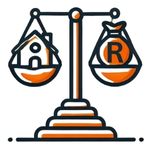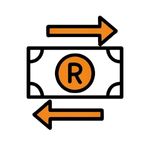
In South Africa, many individuals and businesses face challenges when it comes to settling their tax obligations with the South African Revenue Service (SARS). Whether due to unexpected financial setbacks, miscalculations, or other unforeseen circumstances, falling behind on tax payments can lead to significant stress and potential legal consequences. One option that some consider is taking out a personal loan to cover these outstanding tax debts.
Key Takeaways
- Use Of Personal Loans For Tax Debt: A personal loan can be used to pay off outstanding taxes, with fixed monthly instalments and no need for collateral, especially for those with good credit scores.
- SARS Payment Arrangements: SARS allows instalment-based repayment plans for qualifying taxpayers, provided all returns are up to date and financial hardship is shown.
- Compare Costs Before Borrowing: Weigh the total loan cost against SARS interest and penalties, check repayment terms, and avoid borrowing more than necessary.
How Do Personal Loans Work?
A personal loan refers to a type of credit agreement where a borrower receives a fixed sum of money from a financial institution or lender and agrees to repay it, including interest, over an agreed timeframe through monthly instalments.
These types of loans are often used to access funds quickly when facing urgent costs. Common examples include paying for medical expenses, school-related costs, further education, or combining multiple debts into a single repayment plan.
Most personal loans are unsecured, meaning you do not need to provide any form of collateral, such as a property or vehicle. Since the lender has no asset to claim if the loan is not repaid, unsecured loans carry more risk, which is why interest rates on these loans are generally higher than those on secured credit options.
If your credit rating is strong, you are more likely to be offered a lower interest rate. On the other hand, someone with a low credit score may only qualify for higher rates. Understanding your credit score and taking steps to improve it can make a significant difference to the cost of borrowing.
About Arcadia Finance
Effortlessly secure the loan you need with Arcadia Finance. Choose from 19 trusted lenders, all fully compliant with South Africa’s National Credit Regulator. With no application fees and a fast, reliable process, getting the right financial solution has never been easier.
How Do Taxes Work in South Africa?
Every South African is required to pay tax, but there are also benefits available through tax-free savings accounts and certain investment options. By understanding how tax functions, you can manage your income better and make use of ways to reduce your tax burden legally.
Once you begin formal employment and receive a regular income, you become responsible for paying income tax. Your annual taxable income is calculated by adding together all sources of gross income, then subtracting any allowable tax deductions and amounts that are exempt from tax. The remaining amount is then taxed based on the applicable income tax brackets.
If you switch to a different employer, you should be aware of what will happen with your provident fund or retirement annuity. There may be tax consequences if you withdraw the funds or transfer them elsewhere.
For individuals who are employed full-time, the tax process is usually managed through their employer, who deducts Pay-As-You-Earn (PAYE) tax on their behalf. However, if you earn additional income through a side business or freelance work, you may need to declare this income separately and meet additional tax requirements.

What Are SARS Payment Arrangement Options?
If you owe tax to the South African Revenue Service (SARS) and cannot pay the full amount immediately, SARS offers payment arrangement options to help you manage your debt. These arrangements allow you to pay your outstanding tax debt in instalments over an agreed period, subject to certain conditions.
You can apply for a payment arrangement through the following channels:
- SARS eFiling: Log into your eFiling profile, navigate to “SARS Correspondence,” and select “Payment Arrangement.” Follow the prompts to propose terms or accept SARS’s suggested terms.
- SARS Contact Centre: Call 0800 00 7277 between 09:00 and 16:30 for assistance.
- Email: For deferred arrangements, debt queries, or payment requests, email SARS at debtmanagement@sars.gov.za.
Eligibility Criteria
SARS may approve a payment arrangement if you currently lack assets or liquidity but expect your finances to improve. They may also agree if you are expecting income or funds that can cover the tax debt.
If collecting the debt immediately would be uneconomical or cause hardship, and deferring payment would not affect SARS’s ability to collect later, this could support your request. You might need to provide security, and all outstanding tax returns and reconciliations must be submitted before your application is considered.
Can You Use a Personal Loan to Settle Tax Debt?
Using a personal loan to pay off tax debt is both legally allowed and often a practical solution for South Africans who are unable to meet their obligations to the South African Revenue Service (SARS). While SARS does not recommend specific financial products for settling tax debt, it accepts payment from any legitimate source, provided the amount is paid in full and on time.
Most South African lenders permit personal loans to be used for a range of purposes, including paying outstanding taxes. However, you may need to indicate the intended use of the loan during the application process. Approval will still depend on your credit history, income, and ability to afford the repayments, as assessed under the National Credit Regulator (NCR) guidelines.
SARS is mainly concerned with receiving payment by the due date. It does not typically investigate how the funds were obtained unless there is a reason to suspect illegal activity. If a personal loan helps you avoid escalating penalties, added interest, or potential legal action, it can be a sensible option. Still, you should compare this approach with alternatives, such as setting up a payment arrangement with SARS, before making a final decision.
If you’re wondering what else you can cover with this type of credit besides tax bills, explore our guide on what can a personal loan be used for?
Why Consider a Personal Loan to Pay Taxes
- Clear unpaid tax debt quickly: A personal loan can help you settle your total SARS liability once the amount is known, allowing you to take control of your tax obligations.
- Avoid SARS penalties and interest: Paying off your tax debt early with a loan may help you avoid additional costs that build up over time.
- No collateral required: Personal loans are unsecured, so you don’t need to offer property or assets as security when applying.
- Does not affect taxable income: Loan funds are treated as borrowed money, not income, so they won’t impact your tax filings or increase your taxable amount.
- Flexible repayment options: You can choose a loan term that aligns with your budget and financial goals.
- Predictable and consistent repayments: Fixed interest rates and regular monthly payments make it easier to manage your cash flow with confidence.
It’s a common question: is it really wise to swap one debt for another? Find out if this move makes sense for you by reading our guide, should I pay off my debt with a loan?

What Should You Compare Before Applying for a Loan?
Before applying for a personal loan to settle outstanding taxes in South Africa, it’s crucial to evaluate several factors to ensure the loan aligns with your financial situation and goals. Here’s what to consider:
Total Cost of the Loan vs. SARS Penalties and Interest
Compare the total cost of the personal loan, including interest and fees, with the penalties and interest charged by the South African Revenue Service (SARS) for late tax payments. SARS imposes penalties that can range from R250 to R16 000 per month, depending on your taxable income, and these can accumulate over time . Assessing these costs side by side will help determine the more economical option.
Loan Term, Interest Rate, and Monthly Repayment Affordability
Examine the loan’s term and interest rate to understand your monthly repayment obligations. Longer loan terms may result in lower monthly payments but can increase the total interest paid over time. While monthly payments tend to be higher with shorter terms, the overall interest expense is generally lower. Ensure that the monthly repayments fit comfortably within your budget to avoid financial strain.
Lender Reputation, Service Speed, and Loan Conditions
Research potential lenders to evaluate their reputation and customer service quality. Consider the speed at which they process applications and disburse funds, especially if you need to settle tax debts promptly. Review the loan conditions carefully, including any fees, penalties for early repayment, and flexibility in repayment options.
Responsible Borrowing and Loan Amount
Borrow only what you need to cover your tax obligations. Taking on more debt than necessary can lead to unnecessary financial pressure. Ensure that the loan amount aligns with your repayment capacity and doesn’t compromise your financial stability.
Benefits Of Taking Out A Personal Loan To Pay Your Taxes

Fixed Monthly Repayments
One of the main advantages of using a personal loan is the certainty it provides. These loans usually come with a fixed interest rate and a set repayment term. This means that before you accept the loan, you will know the exact amount you’ll pay in interest, how long the loan will last, and how much your monthly instalments will be. This level of predictability allows you to budget accurately and prevents unexpected increases in repayment amounts.

Lower Interest Rates For Those With Good Credit
Applicants who have a solid credit record can often access lower interest rates on personal loans. Some lenders may offer rates starting from around 3 percent, although this depends on the institution and your financial profile. Generally, individuals with strong credit histories are in a better position to secure affordable repayment terms.

Fast And Straightforward Application
The process of applying for a personal loan is typically quick and easy. Most lenders provide approval decisions within just a few days, and once approved, the money is often paid out within 24 to 48 hours. While a few lenders may request in-person visits to finalise the agreement, many now offer the option to complete everything online, making the process more convenient.

No Collateral Is Needed
Unlike a secured loan or a home equity loan, a personal loan is unsecured. This means that you do not have to provide any form of collateral, such as your property or vehicle. As a result, there is no risk of losing your assets if you fail to repay the loan.

You May Receive A Tax Refund
Although taking out a loan always involves a level of risk, many taxpayers receive refunds from SARS within around 21 days of submitting their return. This refund can then be used to reduce or settle the loan, making repayment more manageable in some cases.

Risks Of Taking Out A Personal Loan To Pay Your Taxes
Higher Rates For Those With Weak Credit
If your credit score is average or below, you may not qualify for the lowest advertised rates. In fact, some lenders may charge as much as 36 percent interest for those with weaker credit. This could make the total cost of the loan significantly higher.
Extra Charges And Fees
Some lenders add various fees to their loan offers. These can include application charges, late payment fees, and origination fees, which may range from 1 percent to 12 percent of the total loan amount. Always check what fees you could be required to pay before agreeing to a loan.
Impact On Your Credit Score
Taking out a personal loan will affect your credit record. If you pay on time for the entire term, your score may improve. However, missing repayments or failing to pay off the loan could result in your credit rating being lowered. This can affect your ability to borrow in the future.
Increase In Your Debt-To-Income Ratio
When you take on a new loan without a change in your income, your debt-to-income ratio (DTI) increases. A higher DTI may make it more difficult to qualify for other forms of credit such as vehicle finance or a home loan later on.
Conclusion
Using a personal loan to pay off outstanding taxes in South Africa can be a practical option for those who need immediate relief and have limited alternatives. It allows taxpayers to avoid growing SARS penalties and legal action while offering fixed monthly repayments that can be easier to manage. However, this approach should only be considered after carefully comparing the total loan cost with SARS’s payment arrangement terms. Responsible borrowing is key, so only take what you can repay, and assess whether a loan truly fits your current financial situation. In some cases, engaging directly with SARS to arrange instalments may be the more affordable route. Always review all available options before committing to a loan.
Frequently Asked Questions
Yes, you can use funds from a personal loan to pay SARS. The money is treated as borrowed funds, not income, so it does not affect your tax calculation.
No, SARS does not track the source of the payment. As long as the debt is paid in full and on time, they do not require disclosure of where the funds came from.
No, personal loan interest is not tax-deductible for individuals unless the funds were used for income-producing purposes, such as running a business.
Missing a repayment could harm your credit score and lead to additional interest or penalty fees from the lender. Consistent missed payments may result in legal action or debt collection.
It depends on your financial situation. If you can qualify for a low-interest loan and need to settle the tax debt urgently, a loan may help. If you’re struggling financially, SARS may agree to a structured payment plan with fewer upfront costs.





